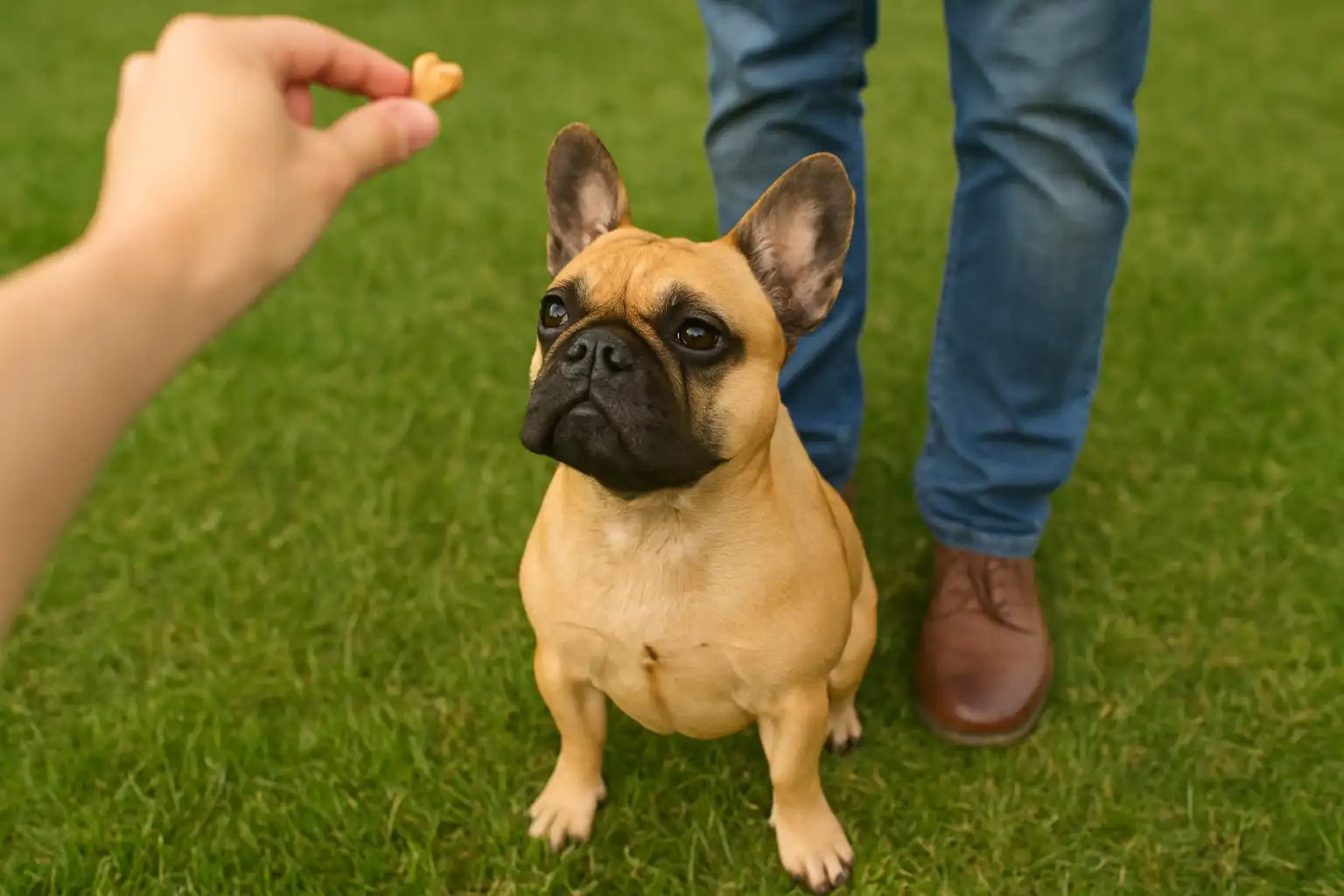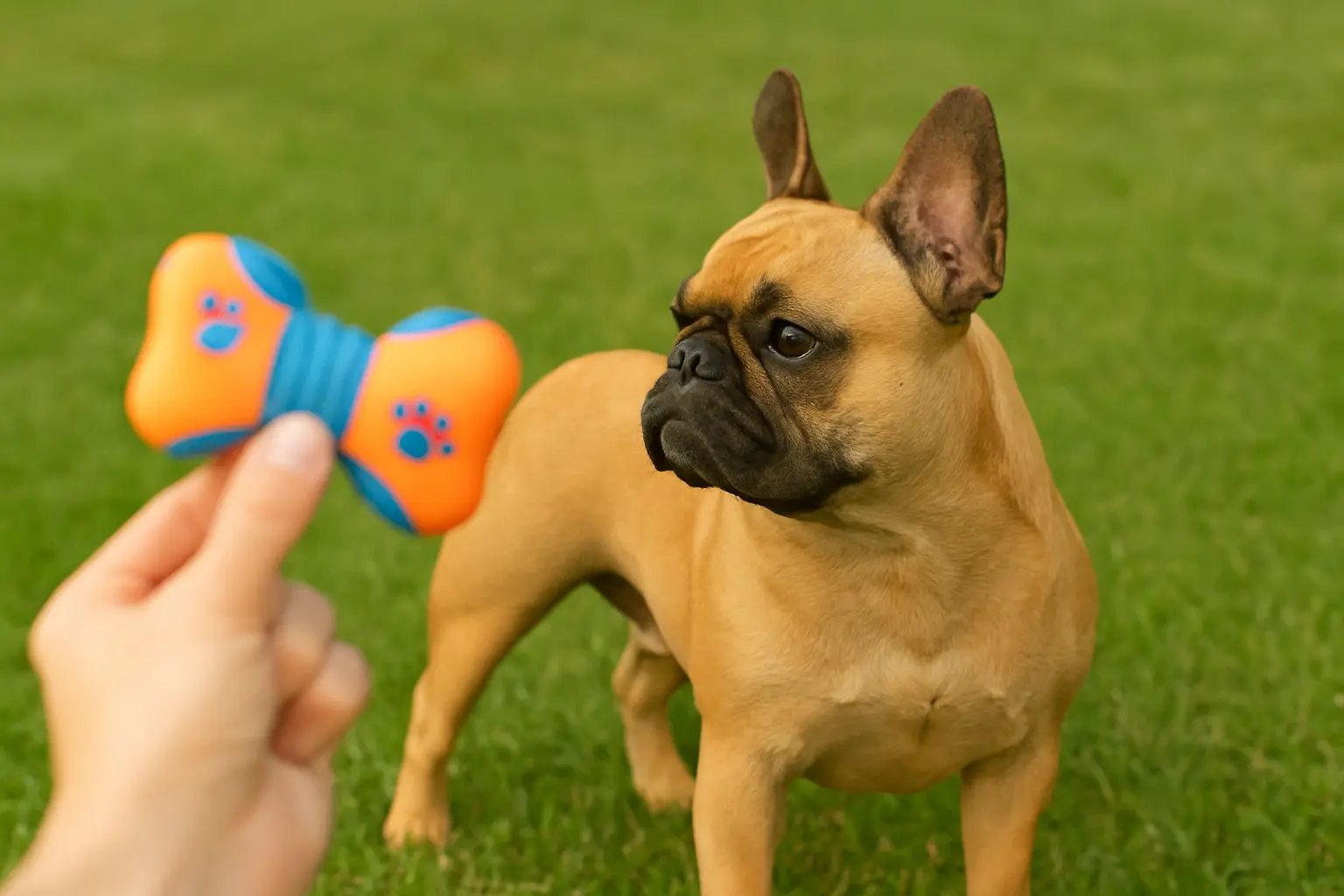Is a French Bulldog easy to train? They’re cute but notoriously stubborn. After training three Frenchies from puppies to adults, I’ve cracked the code on turning their strong-willed nature into obedience—without breaking their lovable spirit.
When I brought home my first French Bulldog, Bruno, I was completely unprepared for his selective hearing. One minute he’d follow commands perfectly, the next he’d look at me with those bat ears perked up as if to say, “Nice suggestion, but I’ll pass.” This rollercoaster journey taught me that French Bulldog training isn’t necessarily difficult, but they do require special understanding and techniques that honor their distinctive temperament.
French Bulldogs have moderate trainability—not as naturally obedient as Border Collies but far more responsive than truly stubborn breeds. When you ask “is a French Bulldog easy to train?”, the answer depends on understanding that their intelligence combined with a desire to please makes basic training achievable, but their independent streak means you’ll need patience, consistency, and the right motivation. Let me walk you through everything I’ve learned about training these adorable, strong-willed companions.
Factors Affecting Trainability of French Bulldogs
After owning three French Bulldogs with wildly different personalities, I’ve learned that several key factors influence how easily your Frenchie will take to training. Many new owners wonder “is a French Bulldog easy to train?” and the answer depends on understanding these elements:
Intelligence Level: French Bulldogs possess above-average intelligence but aren’t working dogs bred specifically for trainability. They understand commands quickly but may choose whether they feel like following them.
Personality Type: Some Frenchies are eager people-pleasers while others are determined to march to the beat of their own drum. My Frenchie Luna would do anything for approval, while Bruno required substantial convincing.
Physical Limitations: Their brachycephalic (flat-faced) structure means they tire quickly and can get uncomfortable during longer training sessions. I’ve found that keeping sessions under 10 minutes prevents frustration and breathing difficulties.
Food Motivation: Most French Bulldogs are extremely food-motivated, which creates excellent training opportunities. When Bruno refused to respond to verbal praise, a tiny piece of chicken suddenly made him a training superstar.
Environment: Frenchies are easily distracted. A quiet training space initially helps them focus before gradually introducing distractions as they progress.

Comparison of French Bulldogs with Other Breeds in Terms of Trainability
Having previously owned a Border Collie before my Frenchies, the difference in training approach was night and day:
| Breed | Trainability | Motivation | Attention Span | Independence |
|---|---|---|---|---|
| French Bulldog | Moderate | Food/Play | Short | High |
| Border Collie | Very High | Work/Praise | Very Long | Low |
| Beagle | Moderate | Food/Scent | Very Short | High |
| Labrador | High | Food/Praise | Moderate | Moderate |
| German Shepherd | Very High | Work/Praise | Long | Moderate |
French Bulldogs rank somewhere in the middle of the trainability spectrum. While not as naturally obedient as herding or working breeds like Border Collies or German Shepherds, they’re significantly more trainable than truly independent breeds like Afghans or Chow Chows.
The key difference I’ve found is that Frenchies require you to answer their persistent “what’s in it for me?” question. While my Border Collie would work tirelessly for praise alone, my Frenchies needed clear incentives and short, engaging sessions to maintain interest. This middle-ground position helps answer the question “is a French Bulldog easy to train?” with a nuanced understanding that they’re neither the simplest nor the most difficult breed to work with.
Common Training Challenges with French Bulldogs
Every French Bulldog owner I’ve met has faced these common hurdles. These challenges often make people question “is a French Bulldog easy to train?” compared to other breeds:
Stubbornness: This is the hallmark challenge. When a Frenchie decides they’re done training, they’re completely done. My Bruno would simply lie down mid-session when he lost interest.
Short Attention Span: Their focus can wander quickly, especially around new sights, sounds, or smells. Training sessions longer than 5-10 minutes often become counterproductive.
Potty Training Difficulties: Many Frenchie owners report slower how to potty train a French Bulldog progress compared to other breeds. Their small bladders combined with stubborn streaks can extend the process by several months.
Separation Anxiety: Their people-oriented nature makes them prone to separation issues, complicating crate training or alone time. Many new owners wonder “is a French Bulldog easy to train?” when facing this challenge. My Frenchie Luna would protest dramatically when left alone, undoing weeks of quiet behavior training.
Selective Hearing: The infamous “Frenchie selective hearing” appears when they choose to ignore commands they’ve previously mastered. This isn’t confusion—it’s a deliberate choice that requires consistent reinforcement.

Effective Training Techniques for French Bulldogs
Through years of trial and error, I’ve found these techniques work best for French Bulldogs. When people ask “is a French Bulldog easy to train?” I tell them it depends entirely on using the right methods:
Positive Reinforcement: Punishment-based training methods simply don’t work with Frenchies. They shut down or become even more stubborn. Is a French Bulldog easy to train? Only if you use reward-based training with treats, praise, and play to create enthusiasm for learning.
Clicker Training: The precise timing of clicker training works wonderfully with French Bulldogs. When investigating “is a French Bulldog easy to train?” I discovered that clicker methods are particularly effective. My Frenchies quickly associated the click with rewards, allowing me to mark exact behaviors I wanted to reinforce.
Keep Sessions Short: 5-10 minute training bursts several times daily are far more effective than longer sessions. I started with just 3-minute sessions with my youngest Frenchie, gradually building duration as his attention span improved.
Consistency is Key: Using the same commands, hand signals, and reward timing helps Frenchies understand expectations. When everyone in our household used different commands, our Frenchie became noticeably confused and progress stalled.
Make Training Fun: Incorporating training into games prevents boredom. Is a French Bulldog easy to train through play? Absolutely! When I framed “stay” practice as a hide-and-seek game, my Frenchie’s compliance skyrocketed compared to formal drills.
Use High-Value Rewards: For challenging behaviors or distracting environments, upgrade from regular treats to “premium” rewards like small pieces of chicken or cheese. This helps maintain motivation when training becomes more difficult.
The Role of Socialization in Training French Bulldogs
I learned the hard way that socialization isn’t separate from training—it’s foundational to it. My first Frenchie, who missed early socialization, struggled with training in new environments or around strangers. When considering if a French Bulldog is easy to train, socialization might be the most important factor determining your success.
Proper socialization helps French Bulldogs become:
- More confident and less reactive during training sessions
- Able to focus despite distractions
- Less likely to develop fear-based behaviors that complicate training
- More adaptable to new training environments
The critical socialization window occurs between 3-14 weeks, but continued exposure throughout their first year significantly improves trainability. Is a French Bulldog easy to train? It can be if you start with proper socialization. After taking my second Frenchie to puppy socialization classes, I noticed dramatic differences in his ability to focus around distractions compared to my first.

The Impact of Age on the Trainability of French Bulldogs
From raising Frenchies from puppyhood through seniority, I’ve observed clear patterns in how age affects training. This is crucial information when considering if a French Bulldog is easy to train, as their trainability changes dramatically throughout their development:
Puppies (8-16 weeks): This golden learning period offers high trainability but with very short attention spans. Many new Frenchie owners ask “is a French Bulldog easy to train?” during this critical window. Focus on socialization, how to train a French Bulldog puppy, and positive associations rather than complex behaviors.
Adolescents (4-12 months): Prepare for regression and testing boundaries. My perfectly house-trained Frenchie suddenly “forgot” his training at 6 months. This challenging period requires renewed consistency rather than new training.
Young Adults (1-3 years): Peak training potential as physical maturity combines with developed focus. When asking “is a French Bulldog easy to train?”, this age range offers the best results. This is when my Frenchies finally mastered reliable recall and more complex commands.
Adults (3-7 years): Training maintenance becomes easier, though introducing entirely new concepts takes longer. My 5-year-old Frenchie still learned new tricks but required more repetition than his younger days.
Seniors (8+ years): Cognitive changes may affect retention, but contrary to the old saying, senior Frenchies can learn new tricks—they just need additional patience and physical accommodations during training.
The key takeaway is to align your expectations with your Frenchie’s developmental stage. The “terrible teens” phase is temporary, and consistency eventually wins out regardless of age.
Behavioral Traits that Influence Training Success in French Bulldogs
Understanding your French Bulldog’s inherent traits helps adapt training to their natural tendencies. When people ask “is a French Bulldog easy to train?” I explain that success depends on working with these inherent traits rather than against them:
People-Oriented Nature: Their desire for human companionship can be leveraged for training success. My Frenchies would work harder when training felt like quality time together rather than formal instruction.
Food Motivation: Their legendary love for food makes reward-based training highly effective. When researching “is a French Bulldog easy to train?”, food motivation is frequently cited as their biggest training advantage. I’ve never met a Frenchie who wouldn’t work for a treat (though they might negotiate for a better one!).
Playfulness: Incorporating play into training sessions capitalizes on their natural exuberance. When I transformed “come” practice into a game of chase (where I ran away instead of toward my Frenchie), recall reliability improved dramatically.
Need for Mental Stimulation: Boredom leads to training resistance. Training that challenges their problem-solving abilities tends to hold their interest better than rote repetition.
Sensitivity: Despite their tough appearance, French Bulldogs are emotionally sensitive. Harsh corrections cause setbacks rather than progress. When I showed disappointment after Bruno’s accident indoors, his anxiety actually made house-training more difficult.

Importance of Consistency in Training French Bulldogs
If there’s one lesson I’ve learned from training three different Frenchies, it’s that consistency trumps almost everything else. French Bulldogs thrive on predictable routines and clear expectations. So when wondering “is a French Bulldog easy to train?” remember that your consistency is perhaps the biggest factor in your success.
When our family wasn’t consistent with Bruno’s training, progress stalled dramatically. Here’s what consistent training really means with a French Bulldog, and why it’s a crucial factor in determining if a French Bulldog is easy to train or not:
Unified Commands: Everyone must use identical words and hand signals. When my partner used “down” for both lying down and getting off furniture, our Frenchie became understandably confused.
Reliable Schedules: Regular training times create anticipation and readiness to learn. My morning training sessions after breakfast became so routine that my Frenchie would actually remind me if I forgot.
Consistent Rules: French Bulldogs quickly exploit inconsistent boundaries. When considering “is a French Bulldog easy to train?”, consistency is perhaps the most critical factor. If jumping on the couch is sometimes allowed, they’ll persistently test rather than learning the rule.
Predictable Consequences: Both rewards and corrections must follow the same pattern every time. When treats occasionally followed commands but not always, my Frenchie’s compliance became equally unpredictable.
Follow-Through: Half-hearted commands or abandoned training sessions teach Frenchies they can wait you out. Every command needs completion, even if it requires helping them succeed.
The challenge with consistency isn’t knowing its importance but maintaining it through busy days and tired moments. Creating simple training routines attached to daily activities (like meals or walks) helps maintain consistency even when life gets hectic.
How to Motivate Your French Bulldog During Training
Motivation is where many Frenchie owners struggle. These aren’t Border Collies eager to work for hours—they need compelling reasons to participate in training. The question “is a French Bulldog easy to train?” often comes down to whether you can motivate them effectively. Over years of trial and error, I’ve discovered these motivation techniques work best:
Find Their Currency: Every French Bulldog has particular rewards they value most. Is a French Bulldog easy to train? It depends greatly on finding their specific motivation. My Luna was motivated by tennis balls, while Bruno would do backflips for cheese. Experiment to find your Frenchie’s highest-value rewards.
Upgrade Rewards for Difficult Tasks: Basic commands might earn kibble, while challenging behaviors deserve chicken or hot dog pieces. This tiered reward system helps maintain enthusiasm during difficult training phases.
Use Life Rewards: Incorporate training into daily privileges. Is a French Bulldog easy to train with everyday motivators? Absolutely! Having my Frenchies sit before meals, wait before exiting doors, or lie down before receiving attention creates practical motivation without constant treats.
Keep Training Novel: Rotate training environments, commands, and reward types to prevent boredom. When Bruno seemed bored with our living room sessions, simply moving to the backyard rekindled his enthusiasm.
Make It Interactive: French Bulldogs crave engagement. Using excited tones, animated movements, and genuine praise makes you more interesting than environmental distractions.
Know When to End: Stopping while they’re still engaged and successful creates positive associations. When I noticed early signs of boredom or frustration, ending on a quick success preserved their motivation for next time.

Resources for French Bulldog Training Tips and Techniques
When I struggled with training my first Frenchie, these resources proved invaluable for answering the question “is a French Bulldog easy to train?” and providing breed-specific solutions:
Books Specifically for Bully Breeds:
- “Training the Bulldog” by Joan Hustace Walker offers bully-specific techniques that acknowledge their unique temperament
- “How to Train a French Bulldog” by Kelly Reed contains week-by-week training plans tailored to Frenchies
Online Communities:
- The r/Frenchbulldogs subreddit has a wealth of real-world experience and support
- French Bulldog owner groups on Facebook provide breed-specific advice and encouragement
Professional Training:
- Finding trainers with small-breed or specifically bully-breed experience made a significant difference in our progress
- Group classes designed for stubborn breeds taught me techniques I wouldn’t have discovered alone
Apps and Video Resources:
- The “Dogo” app offers training plans adaptable to French Bulldog attention spans
- Zak George’s YouTube channel features effective positive reinforcement techniques that worked well with my Frenchies
- “French Bulldog Training Made Easy” video series by Victoria Stilwell addresses common Frenchie challenges and answers the question “is a French Bulldog easy to train?” with practical demonstrations
Veterinary Behaviorists:
- For severe training challenges, consulting veterinary behaviorists helped identify if physical issues (like breathing difficulties) were affecting training success
The most valuable lesson I learned is that seeking help isn’t failure—it’s responsible ownership. The training approach that works for a Labrador often needs significant modification for a French Bulldog. This is why the question “is a French Bulldog easy to train?” doesn’t have a simple yes or no answer – it depends largely on having the right resources and guidance.
According to the American Kennel Club, French Bulldogs respond best to positive reinforcement techniques and short, engaging training sessions that accommodate their brachycephalic (flat-faced) structure and tendency to overheat quickly.
Conclusion: So, Is a French Bulldog Easy to Train?
After years with French Bulldogs, I can confidently say they exist in a training middle ground—not the most challenging breed but certainly not the easiest. Their intelligence helps them grasp concepts quickly, but their independent nature means they need convincing reasons to cooperate.
So, is a French Bulldog easy to train? The French Bulldog owner who understands their unique combination of intelligence, stubbornness, and people-pleasing will find training success through patience, consistency, and relationship-building. When you adapt your expectations and techniques to their distinctive personality, a well-trained Frenchie is absolutely achievable.
Remember that training isn’t just about obedience—it’s about communication, trust, and enrichment. When asking “is a French Bulldog easy to train?”, remember that a training session that ends with both you and your Frenchie happier for the experience is always successful, regardless of perfect execution.
If you’re considering a French Bulldog or struggling with training your current Frenchie, take heart. With the right approach, even the most stubborn French Bulldog can become a well-mannered companion who still maintains that characteristic Frenchie charm we all adore. For more detailed guidance, check out our complete French Bulldog training guide with step-by-step techniques.
Frequently Asked Questions
Is training a French Bulldog hard?
Training a French Bulldog is moderately challenging due to their independent nature and stubborn streak. While they learn commands quickly, they often decide whether they want to follow them. To answer “is a French Bulldog easy to train?” – with consistent positive reinforcement, short training sessions, and high-value rewards, most Frenchies can master basic and intermediate commands despite their willful temperament.
Is a French Bulldog good for beginners?
French Bulldogs can be good for first-time dog owners who understand their specific needs. When asking “is a French Bulldog easy to train?” for a beginner, consider that they’re less demanding than high-energy breeds, have minimal exercise requirements, and form strong bonds with owners. However, beginners should be prepared for their stubborn streak during training, potential health issues, and moderate financial investment in their care.
Is owning a French Bulldog hard?
Owning a French Bulldog presents moderate challenges. While they’re affectionate and require less exercise than active breeds, Frenchies demand consistent training, proper temperature management due to breathing issues, regular health monitoring, and can be expensive to maintain. When considering “is a French Bulldog easy to train?” as part of ownership, understand that their stubborn personality and potential health concerns require committed, informed ownership.
Are French Bulldogs easily house trained?
French Bulldogs are not easily house trained compared to many breeds. Their house training typically takes 4-6 months or longer due to their stubborn temperament and small bladders. Consistent schedules, positive reinforcement, and patience are essential, as accidents may occur for up to a year. Most Frenchies eventually become reliable with persistent, structured training. For step-by-step guidance, see our guide on how to potty train a French Bulldog.

